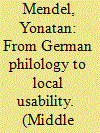|
|
|
Sort Order |
|
|
|
Items / Page
|
|
|
|
|
|
|
| Srl | Item |
| 1 |
ID:
146767


|
|
|
|
|
| Summary/Abstract |
This article examines the pedagogical shifts in the study of Arabic at the Hebrew Reali School in Haifa, the leading school for Arabic studies in the Jewish education system. Analyzing the moulding of Arabic studies in the crucial years of educational institutionalization (1913–48), it demonstrates an inevitable tension with regard to Arabic studies: between the German philological approach and the ‘practical’ approach. In light of this tension, it shows the gradual emergence of a new ‘practical’ approach in the Jewish education system in Palestine, which was not only the result of a clash between different pedagogical methods, but was propelled by another, powerful, clash: that of the heated political conflict in Palestine. Using primary sources from seven different archives, in Israel, Britain and Germany, this article reveals that the shift towards practicality was motivated by political developments and ideological shifts as much as by pedagogical considerations, and therefore has had significant ramifications for the emerging field of Arabic studies in Jewish schools in Palestine/Israel.
|
|
|
|
|
|
|
|
|
|
|
|
|
|
|
|
| 2 |
ID:
184463


|
|
|
|
|
| Summary/Abstract |
This article aims to shed light on two principle subjects relating to language and culture in the Jewish community in Palestine before the rise of Zionism. First, it attempts to describe and to deepen our understanding of the Yiddish of the Ashkenazi community spoken in Historical Palestine in the 18th and 19th centuries. This dialect of Yiddish, referred to in this article as ‘Palestinian Yiddish’, was permeated with Arabic influences. Secondly, and in conjunction with addressing this dialect, the article explores various facets of the knowledge of Arabic among the Ashkenazi community in the country. In this respect, it highlights that the increased knowledge of Arabic in the Ashkenazi community indicates not only acquaintance with the language itself, but also encompasses broader insights about the relations between the Ashkenazi community and the Arab-Palestinian people which challenges the traditional research on the topic. Based on socio-linguistic analysis, as well as inslights from language contact and language and society, this article claims that the language parameter can highlight the social and political routes in which the Ashkenazi Palestinian community was paving, including those of acclimation, integration and being part of the general hegemonic Arab culture. As I argue, this is not unconnected to Zionism’s strenuous recoil from both of these languages—Yiddish and Arabic. ‘Palestinian Yiddish’ and ‘Ashkenazi Arabic’, therefore, jointly reveal a period as it once was and is no more: language skills and social relations that posed a threat to separatist practices that were to be pushed forward by the Zionist movement.
|
|
|
|
|
|
|
|
|
|
|
|
|
|
|
|
| 3 |
ID:
120849


|
|
|
|
|
| Publication |
2013.
|
| Summary/Abstract |
This article analyses the creation of the accelerated Arabic language studies programme in the Israeli-Jewish school system, 'The Oriental Classes', over the years 1950-67. The article investigates the networks that enabled and controlled the 'Oriental Classes', the main actors involved in its operation, the aims of this programme as well as the ways to achieve them. It argues that this flagship programme serves as an example of the dominant orientation with which Arabic studies have been associated in Israeli-Jewish society, that of political and military intelligence needs, and that this can add a new angle to our understanding of the way Israel perceives the Arab world, vis-à-vis its relations with the Arab 'other' and the Palestinian citizens of Israel.
|
|
|
|
|
|
|
|
|
|
|
|
|
|
|
|
|
|
|
|
|